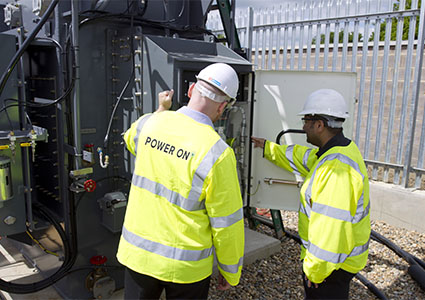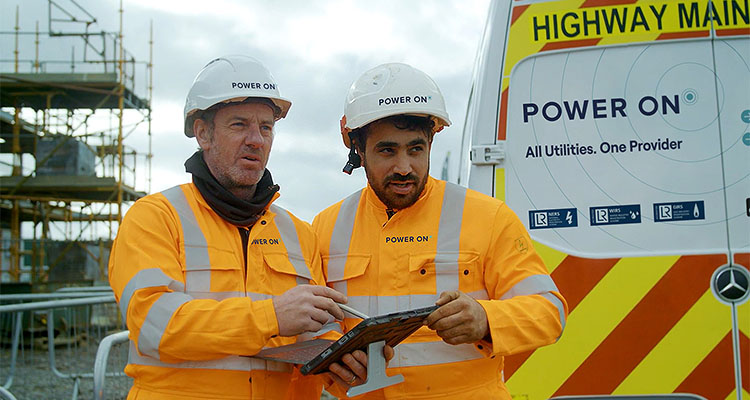Pioneering multi-utility provider Power On sets a new benchmark for workforce empowerment
In the UK’s new connections market, Power On stands out as the leading independent connections provider. Electricity, water, wastewater, fiber, heat, and gas infrastructure all form part of its all-utilities, one-provider solution. Power On is part of the BUUK Infrastructure Group (BUUK), the UK’s top provider of last-mile multi-utility networks, serving over two million homes. As such, the company boasts a scale, structure, and credentials that embody a level of experience and capability currently unparalleled in the market. This positions Power On as a competitive and truly independent alternative to the regional network operators. Neil Fitzsimons, Managing Director, offers a more comprehensive overview of the business.
“In 2003, five individuals, who used to work for the regional electricity company, identified a market need for choice and competition to provide essential electricity services. Power On was established to meet this need. The business grew quickly and was acquired by BUUK in 2008. Following this acquisition, the company shifted from building electricity networks for handover to the incumbent network operator, to installing networks that are owned and operated by BUUK. A true disruptor in the market, Power On became the first independent connection provider to gain accreditations to work live on electricity networks and to develop off-site networks to link new sites to the electricity regional company grid.
services. Power On was established to meet this need. The business grew quickly and was acquired by BUUK in 2008. Following this acquisition, the company shifted from building electricity networks for handover to the incumbent network operator, to installing networks that are owned and operated by BUUK. A true disruptor in the market, Power On became the first independent connection provider to gain accreditations to work live on electricity networks and to develop off-site networks to link new sites to the electricity regional company grid.
Alternative fuel source
“In 2019, we improved our service by providing a one-stop-shop, multi-utility solution. BUUK owned regulated water and wastewater networks through our IWNL team. This meant Power On could offer these services. We were also aware that building regulations will see the end of fossil fuel for heating homes. Zero-carbon grid electricity will replace gas, using heat pumps and heat networks. Heat is electricity and fits with our proven expertise. Today, we deliver all utilities required for new build development, including electricity, gas, water, wastewater, heating, cooling and telecoms, under a single contract, a service our customers really enjoy,” Neil elaborates.
As the Future Homes Standard is coming into force in the UK, Power On is adjusting its suite of products and services to meet decarbonization targets. “As part of BUUK, we already serve more than two million homes and have connected gas into new builds for many years. However, we appreciate that to meet the government’s ambitious decarbonization targets, alternative fuel sources are needed. Therefore, we have developed a solution that not only reduces carbon emissions through a highly efficient, electricity-powered heat pump for heating homes but also ensures future readiness for achieving Net Zero targets as the grid decarbonizes. This approach involves an energy center driven by air, water or ground source heat pumps, achieving an energy conversion efficiency ranging between 300 and 400 percent from electricity to heat. Alongside the heat pumps, there are large water storage tanks, each with a capacity of 60,000-to-80,000 liters. The advantage of these tanks is that they can be charged during periods when energy prices are low, typically resulting in lower embodied carbon in the energy used. In other words, we leverage the cheap energy generated when wind and solar resources are abundant to charge the tanks. We then distribute the resulting heated water throughout the site during peak demand periods when energy prices are higher.
“This solution offers us three significant benefits. First, it enables us to pass on commercial benefits to consumers connected to our heat networks by selling the heat at a reduced rate. Second, it allows us to guarantee the use of lower carbon electricity to power the heat pumps, thereby reducing the carbon footprint of the heat supplied. Third, it helps us significantly decrease the overall electricity capacity requirements for the development, which is crucial given the ongoing challenges we face, including necessary reinforcement works on the electricity grid. In fact, we are currently dealing with several issues as we strive to decarbonize heating and transportation at the same time while accommodating a substantial increase in data center load. These three factors collectively strain the electricity grid, so doing everything we can to flatten the demand on the grid is paramount.
“Typically, the grid experiences its highest pressure during the evening hours in winter when people come home from work, causing demand to peak. Conversely, the demand drops substantially during the day. Our storage tanks enable us to shift this demand, benefiting both our customers and the overall grid. Another crucial component in alleviating strain on the grid is the inclusion of backup electricity boilers. These serve as a contingency measure for extreme, worst case scenario weather conditions. The electricity boilers can be used to top up the heat pump, particularly air source heat pumps as when the ambient temperature plummets, it affects the efficiency of the pump. When combined with the storage tanks, this setup facilitates charging the tanks with lower cost electricity, which is why we use it in our energy center,” Neil explains.
 Power On’s groundbreaking solutions contribute to attracting new customers. However, Neil reveals that the company’s emphasis on customer service and investing in its workforce are key drivers in encouraging repeat business. “Our business philosophy is simple: by treating our staff fairly, looking after them, and giving them opportunities for career progression and development, we foster a psychologically safe workplace that encourages optimal performance. In return, our workforce delivers the best possible service to our customers, ensuring their loyalty and repeat business. This positive cycle results in happy customers who are easier to collaborate with, ultimately making our employees’ jobs more manageable. Even in times of recession, we remain committed to investing in our people, understanding that retaining talent is fundamental to our success. For seven consecutive years, we have ranked among the best workplaces in the UK. This achievement has enabled us to better connect with our people and get valuable feedback. We know there is always room for improvement, but we work hard to engage with our staff to comprehend their needs and strive to be better.
Power On’s groundbreaking solutions contribute to attracting new customers. However, Neil reveals that the company’s emphasis on customer service and investing in its workforce are key drivers in encouraging repeat business. “Our business philosophy is simple: by treating our staff fairly, looking after them, and giving them opportunities for career progression and development, we foster a psychologically safe workplace that encourages optimal performance. In return, our workforce delivers the best possible service to our customers, ensuring their loyalty and repeat business. This positive cycle results in happy customers who are easier to collaborate with, ultimately making our employees’ jobs more manageable. Even in times of recession, we remain committed to investing in our people, understanding that retaining talent is fundamental to our success. For seven consecutive years, we have ranked among the best workplaces in the UK. This achievement has enabled us to better connect with our people and get valuable feedback. We know there is always room for improvement, but we work hard to engage with our staff to comprehend their needs and strive to be better.
Valued employees
“Furthermore, we have invested a lot of time and effort in developing internal training. At present, we offer extensive on-the-job training, mentoring buddy schemes, our own training courses, and we also sponsor people to undertake external academic qualifications and training courses. We invest significantly more than our competitors in training, as we believe it is the right thing to do. Besides, running a business with untrained staff becomes expensive in the long run. As a construction company, our employees are often working on the front line in high-risk environments. To address this, we have established a behavioral safety program a few years ago, focusing on the real practical risks our workforce faces and well-being support, thus creating a culture where everyone feels safe to speak up and ask questions. Alongside this program, we have mental health first aiders available throughout the organization, providing confidential support and advice through employee assistance programs,” Neil says.
Learning opportunities
According to Power On’s behavioral safety program and general company culture, promoting a healthy work environment extends beyond engaging its own workforce, as Neil points out: “In line with our goal to promote engagement, we bring together employees from various parts of the business, who may ordinarily interact with each other, all in the same room. From there, we conduct workshops that delve into several real-life scenarios of incidents that have taken place, giving our staff the opportunity to debate and discuss these things. Our focus is on encouraging everyone to occasionally have difficult conversations that when avoided can lead to more issues. This approach has also proved very successful with our supply chain and contractors, whom we sometimes convene with our own workforce to strengthen relationships within our supply chain network. Cultivating enduring relationships with our supply partners has been instrumental to our success and is especially important during periods where pressure and demand are high. Often, our customers are not really interested in our operational intricacies and simply seek to sell homes. Thus, it is our duty to guide them through the process and explain to them why we need to do things a certain way. For instance, they might make requests that seem reasonable on the surface, but our paramount concern is executing tasks properly to keep everyone safe.
“While our program has been effective thus far, it is still only in its early stages. The fundamental principles of our program revolve around caring, taking ownership, and continuous learning. We begin with demonstrating care for ourselves and our colleagues. Then, the next phase is about encouraging everyone to take responsibility for their actions. This progression culminates in a focus on learning, where we celebrate anytime we do an outstanding job but when things do go wrong and we inevitably encounter challenges, we also ensure that we can learn from our mistakes. We aim to foster a culture where making mistakes is acceptable, but what is not is missing the opportunity to learn from those mistakes or to share that learning,” Neil concludes.
Through a journey marked by disruptive innovation and a strong commitment to its customers and workforce, Power On stands as a reliable and trusted independent alternative to regional network operators. By prioritizing exceptional customer service and investing in its workforce, the company has cultivated a loyal customer base and a thriving, engaged workforce. This winning formula positions Power On for continued growth and success in the years to come.
